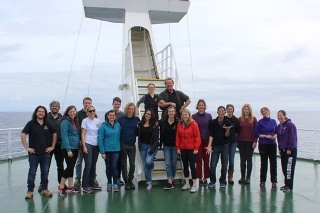Sep 1 2017
A group of international researchers have returned from a highly successful expedition to the Labrador Sea and coastal Greenland, led by scientists at the University of Bristol.
 The ICY-LAB team (Credit: Martin Bridger)
The ICY-LAB team (Credit: Martin Bridger)
The aim of the expedition was to investigate the role of melting ice on the chemistry and biology of the oceans – to find out how melting ice supplies the essential nutrients that feed marine life.
Dr Kate Hendry from the University of Bristol’s School of Earth Sciences, led the expedition.
She said: "We used cutting edge, automated equipment to make measurements and take samples.
"Two automated gliders were deployed, and took high resolution measurements of water temperature, saltiness, and particles in the water – including algae that take up carbon from the atmosphere and form the bottom of the marine food chain.
"A remotely operated vehicle, essentially an underwater robot that it controlled from the ship, took high-definition video images of biology on the seafloor, as well as samples of sediments and water."
The team’s preliminary results show that glacial channels in the shallow, continental shelf, fed low salinity waters into the open ocean, and that these channels are key in the distribution of nutrients and marine organisms.
The sediments within the channel are also likely to be important in supplying nutrients to the overlying seawater.
However, the scientists have a lot of data and many more samples to analyse before they can fully tie together the physical, chemical and biological impacts of the meltwater.
The expedition was on board the RRS Discovery, a ship operated by the Natural Environment Research Council in the UK. The research was funded by the European Research Council.
ICY-LAB Expedition to Greenland, Summer 2017